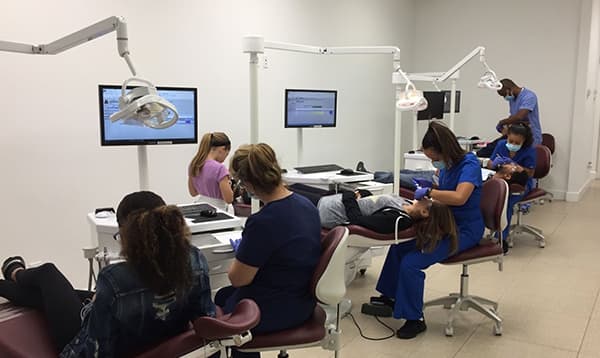How to Choose a Dentist Near You That Truly Listens
Finding the right dentist goes beyond proximity and insurance coverage. While these practical considerations matter, the quality that often makes the biggest difference in your dental experience is whether your dentist truly listens to you.
A dentist who listens creates an environment where you feel heard, understood, and respected. This isn’t just about comfort—though that’s important too. When your dentist takes time to understand your concerns, medical history, and personal preferences, they can provide more effective, personalized care that addresses your specific needs.
Many patients have experienced the frustration of feeling rushed through appointments or having their concerns dismissed. These experiences can lead to anxiety, mistrust, and even avoidance of necessary dental care. The good news is that excellent, attentive dentists exist, and with the right approach, you can find one who prioritizes communication and patient care.
This guide will help you identify the qualities that make a dentist a good listener and provide practical steps to find a dentist near you who will truly hear what you have to say.
Why a Listening Dentist Matters
Better Understanding of Patient Needs
When dentists take time to listen, they gain crucial insights that go beyond what they can observe during a clinical examination. Your concerns about sensitivity, anxiety, or past traumatic experiences all influence how treatment should be approached. A listening dentist will ask about your daily habits, dietary preferences, and lifestyle factors that might affect your oral health.
This comprehensive understanding allows them to create treatment plans that work for your specific situation. For instance, if you mention that you grind your teeth during stressful periods at work, a good listener will factor this into their diagnosis and recommend appropriate protective measures.
Improved Treatment Outcomes
Research consistently shows that patients who feel heard by their healthcare providers experience better treatment outcomes. When you can openly communicate your symptoms, pain levels, and concerns, your dentist can make more accurate diagnoses and adjust treatments accordingly.
A dentist who listens will also be more likely to explain procedures thoroughly, ensuring you understand what to expect and how to care for your teeth afterward. This clear communication leads to better compliance with treatment plans and improved long-term oral health.
Increased Patient Comfort and Trust
Dental anxiety affects millions of people, often stemming from feelings of powerlessness or fear of the unknown. A dentist who listens creates a safe space where you can express these concerns without judgment. They’ll work with you to develop strategies for managing anxiety and ensure you feel comfortable throughout your visit.
This trust-building process is particularly important for patients who have had negative dental experiences in the past. When you feel genuinely heard and respected, you’re more likely to maintain regular dental visits and address problems before they become serious.

Dental Treatment Service
Key Qualities of a Good Listener
Attentive and Patient Demeanor
A dentist who truly listens exhibits patience during consultations and dental examinations. They make eye contact, avoid rushing, and give you their full attention when you’re speaking. You’ll notice they’re not constantly checking their watch or seeming distracted by other tasks.
Good listening dentists also demonstrate active listening behaviors. They might nod to show understanding, lean in when you’re speaking, or take notes about your concerns. These small gestures signal that they value what you’re telling them and are committed to understanding your perspective.
Asks Clarifying Questions
Rather than making assumptions, attentive dentists ask follow-up questions to ensure they understand your concerns completely. If you mention tooth pain, they’ll ask about when it occurs, what triggers it, and how you would describe the sensation. They might inquire about your pain management strategies or how the discomfort affects your daily life.
These detailed questions help them gather comprehensive information needed for accurate diagnosis and treatment planning. A dentist who asks clarifying questions is demonstrating their commitment to understanding your unique situation.
Provides Clear Explanations
Excellent communicating dentists translate complex dental terminology into language you can understand. They explain procedures, treatment options, and oral health concepts in ways that make sense to you. They’re also willing to repeat information or answer questions multiple times without showing impatience.
Good listeners check for understanding throughout their explanations. They might ask if you have questions or if anything needs clarification. Some may use visual aids, models, or drawings to help explain procedures or show you what they’re seeing in your mouth.
How to Find a Dentist Who Listens
Online Reviews and Testimonials
Begin your search with online reviews, focusing on feedback about communication and bedside manner. Specifically, look for comments that describe how the dentist handles anxious patients, explains procedures, or addresses concerns. Notice recurring themes; multiple mentions of rushed appointments or poor communication are definite red flags.
Beyond star ratings, dive into detailed comments to understand patient interactions. Professional review sites, Google, and dental practice websites are great resources for testimonials. Even social media pages can offer clues about how practices engage with patients and handle issues.
Initial Consultation and Questions to Ask
Schedule a consultation or cleaning appointment to get a firsthand sense of the dentist’s communication style. During this visit, pay attention to how they interact with you from the moment you arrive.
Ask specific questions that require detailed responses:
- “Can you explain what you’re looking for during the examination?”
- “What are my treatment options, and what are the pros and cons of each?”
- “How do you typically handle patients who experience dental anxiety?”
- “Can you walk me through what I can expect during this procedure?”
Notice how thoroughly they answer your questions and whether they seem genuinely interested in addressing your concerns. A good listener will welcome your questions and provide comprehensive answers without seeming rushed or annoyed.
Check for Communication-Focused Training
Some dentists pursue additional training in patient communication, anxiety management, or sedation techniques. Look for mentions of this specialized training on their website or ask about it during your consultation. Dentists who invest in communication training demonstrate their commitment to patient-centered care.
Professional affiliations with organizations focused on patient care, such as the Academy of General Dentistry or specialized anxiety management groups, can also indicate a dentist’s commitment to comprehensive patient care.

Dental Treatment Service Provider
Spotting Red Flags
Rushing Appointments
Be wary of dentists who seem to rush through examinations or consultations. Signs of rushing include spending very little time examining your teeth, not asking about your concerns, or seeming impatient when you ask questions. While efficiency is important, adequate time should be allocated for thorough examinations and patient communication.
A dentist who is always running significantly behind schedule might be overbooking appointments, which can lead to rushed visits and inadequate attention to individual patient needs.
Dismissing Concerns
Pay attention to how the dentist responds when you express concerns or ask questions. Red flags include dismissive language, minimizing your symptoms, or suggesting that your concerns aren’t valid. Phrases like “that’s nothing to worry about” without proper explanation or “everyone experiences that” can indicate poor listening skills.
A good dentist will take all concerns seriously, even if they turn out to be minor issues. They’ll explain why something might not be concerning rather than simply dismissing it.
Poor Communication Skills
Watch for signs of poor communication, such as using excessive jargon without explanation, providing vague answers to specific questions, or seeming uncomfortable discussing treatment options. A dentist who struggles to explain procedures clearly or becomes defensive when asked questions may not be the right fit.
Also notice whether staff members seem well-trained in communication. Poor communication often extends throughout the entire practice, from scheduling appointments to handling billing questions.
Introducing Smile Perfection Dental & Braces
Overview of the Clinic’s Philosophy
Smile Perfection Dental & Braces exemplifies the principles of attentive, patient-centered dental care. Their practice philosophy centers on the belief that effective dental treatment begins with truly understanding each patient’s unique needs, concerns, and goals.
The clinic recognizes that every patient brings their own experiences, anxieties, and expectations to dental appointments. Rather than taking a one-size-fits-all approach, they prioritize getting to know each patient as an individual and tailoring their care accordingly.
Emphasis on Patient-Centered Care
At Smile Perfection Dental & Braces, patient-centered care means putting your comfort, understanding, and preferences at the forefront of every interaction. The team takes time during initial consultations to learn about your dental history, current concerns, and personal goals for your oral health.
This approach extends beyond the clinical examination to include discussions about your lifestyle, dietary habits, and any factors that might affect your treatment plan. The practice understands that sustainable oral health improvements require treatments that fit seamlessly into your daily life.
Highlighting Listening Skills and Communication
The dental professionals at Smile Perfection Dental & Braces are trained in effective communication techniques that ensure patients feel heard and understood. They use clear, jargon-free language to explain procedures and treatment options, always checking to make sure patients understand before moving forward.
The practice encourages questions at every stage of treatment and provides comprehensive answers that address both the technical aspects of procedures and their practical implications for patients’ daily lives. This commitment to clear communication helps build the trust and understanding necessary for successful long-term dental care.

Dental Treatment Expert
Making Your Decision and Moving Forward
Choosing a dentist who truly listens is crucial for your long-term oral health. The right dental professional provides excellent clinical care and fosters an environment where you feel respected and involved in your treatment.
This partnership approach, where a dentist values your input to create plans aligned with your lifestyle, leads to better outcomes and a more positive experience. Take the time to research dentists, ask questions, and trust your instincts to find the right match.
Ready for a dental team that truly listens? Schedule a consultation with Smile Perfection Dental & Braces today. Experience their patient-centered approach, where your concerns are heard and addressed with the care you deserve.
https://www.google.com/maps?cid=2872398540371059758
